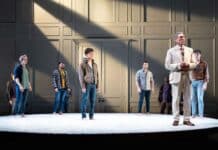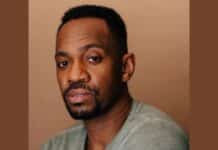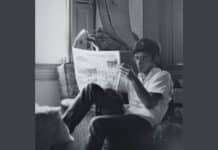By Lorraine Treanor
Joey Parsons. She is among the most frequently cast actors at the Contemporary American Theater Festival in Shepherdstown, West Virginia, appearing, to date, in six plays, all but one world premieres. This award-winning New York actor has given first voice to, among others, Heather, the tormented teacher in Johnna Adams’ Gidion’s Knot, and two characters named Woman — one chaotic and set-upon and the other a bold conjurer — in Allison Gregory’s take on the Greek fable Not Medea. In one season, she was Jan in Michael Weller’s two-actor 50 Words, about a marriage at the point of combustion, performed in the tight confines of a tiny kitchen, and, with barely a two-hour break between shows, played Linnie and her sister Sara in Victor Lodato’s Dear Sara Jane. That role prompted theater critic Tim Treanor to write what, to me, is true each time I see her: “Occasionally there is an actor who is so suited for her role that you immediately suspect the part was written for her.”
Joey naturally hews to new plays. She has worked with actor/playwright Kate Hamill before and is now playing four supporting roles in Hamill’s world premiere The Light and The Dark (The Life and Times of Artemisia Gentileschi) presented by Primary Stages at 59E59 Off Broadway. This is a play about the 17th-century woman who was determined to be a great painter. Kate plays Artemisia and has handed Joey the pivotal role in a transformational scene that not only cracks open the tragic story to reveal the artist’s eventual way but also caused me to reflect on the creative freedom of acclaimed artists today such as Jadé Fadojutimi.
Some of you enjoy theater as magic and prefer to leave the offstage lives of its creators a mystery. You can leave us here to catch Joey’s performance through December 15, 2024, at 59E59.
For the rest of you, gather close. Our conversation is underway.
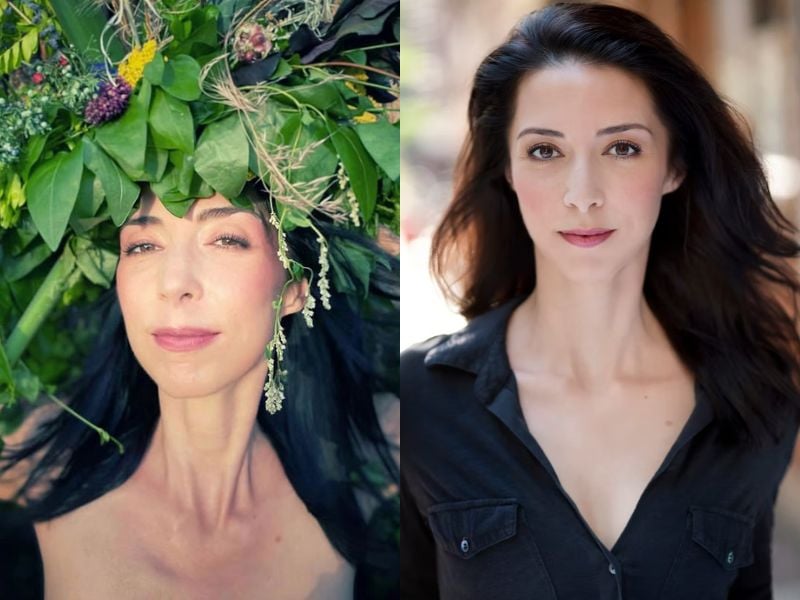
Lorraine Treanor: I understand you grew up in Santa Fe, New Mexico. Do you remember the first play you saw?
Joey Parsons: I’ve always been such a restless spirit, and as a very young person, I could not wait to leave Santa Fe. It’s only in hindsight that I see what a remarkable place it was to grow up. I was surrounded by arts and culture, and I was fortunate to fall in with a terrific group of kids — all weird and scrappy and creative, and just bored enough that we made up a lot of our own entertainment.
I can’t quite remember the very first play I saw, but as a grade, we’d often be bussed to see local theater. I remember a Much Ado About Nothing at the Armory for the Arts, and an Athol Fugard play that once came to my grade school gym. I was always thrilled. As professional actors, we often joke-complain about performing in student matinees which often start at 10:30 am, but I secretly (usually) have a pretty good attitude about them because as rowdy or lethargic as the kids may seem, there’s always at least one that will be really affected by the experience. I was in an opera when I was seven, playing the daughter of the leads. The Santa Fe Opera is world-class and world-renowned, but as a child, it was just my magical playland. The cast and crew took me on as a sort of mascot, and I learned so much about props and costumes, and to this day, the smell of freshly cut lumber takes me right back to that extraordinary time. It’s the smell of creation, of excitement, of fun, of tremendous joy and possibility.
I read that you originally set out to become a dancer. What convinced you to become an actor?
I was an energetic child who absolutely loved to dance. Recognizing my love of movement, my mother enrolled me in ballet classes. Though initially resistant, believing it might be too restrictive, I took to it like a duck to water. My favorite place to be in the world was the ballet studio. In my teens, I became more attracted to modern dance. One summer, the Performing Arts School put on a production of West Side Story and they needed dancers. I was given a few lines and got a laugh at each performance. That certainly flipped a switch inside! I loved getting a laugh! I also realized that I could use my body in ways that made people laugh, or perhaps not even recognize me, which was the best compliment. In undergrad, I set out to be a dance major, with a focus on flamenco. I adored flamenco — I was surrounded by it, growing up in Santa Fe, and it well suited my body type and style. I’d also signed up for some theater classes, having loved my high school drama teacher. I was immediately cast in mainstage college shows and found the dance department at the time to be … competitive. While I believe a certain amount of competition can be healthy, I was just figuring out that what I loved most was collaboration. It’s where I felt most full. It’s where I felt I excelled and grew the most. I began to get excruciating shin splints from all the flamenco classes, and so the gradual shift to a major in theater felt seamless and correct.
What from your early training is still a part of your toolbox?
I’ve had some marvelous teachers, both in dance and in acting. Steve Dobuszynski, my high school drama teacher, translated every line of Romeo and Juliet into modern vernacular. I couldn’t believe how much sense it could make! In professional auditions, it’s when I went back to the thought of “How do I make this clear? How do I say this and sound like a real person, rather than a person ‘doing’ Shakespeare?” that I actually started booking Shakespeare. In fact, it’s all I was hired to do for many years! I had a few fantastic teachers in college, too, who encouraged an enormous amount of play and exploration. I especially loved creating the physicality of characters. I loved going to Thriftown and spending $5 or $10 on an outfit for a one-act final or scene study for class. And I remember several instances in which it was recognized that I had a penchant for working from the outside in rather than the other way around, and I was encouraged to feed what fed me. If that’s where I was getting my ideas, if that was what was making my work any good, and if there was any good to it, I was encouraged to soldier on in that direction. I feel I was steered in another direction at Yale, guided to be more internal, which was just as valuable but not as easy for me. I feel like I’ve settled into a lovely amalgamation of the two. Both ways have mellowed and stewed inside me for enough time that I have many awesome tools at my disposal for any given role.
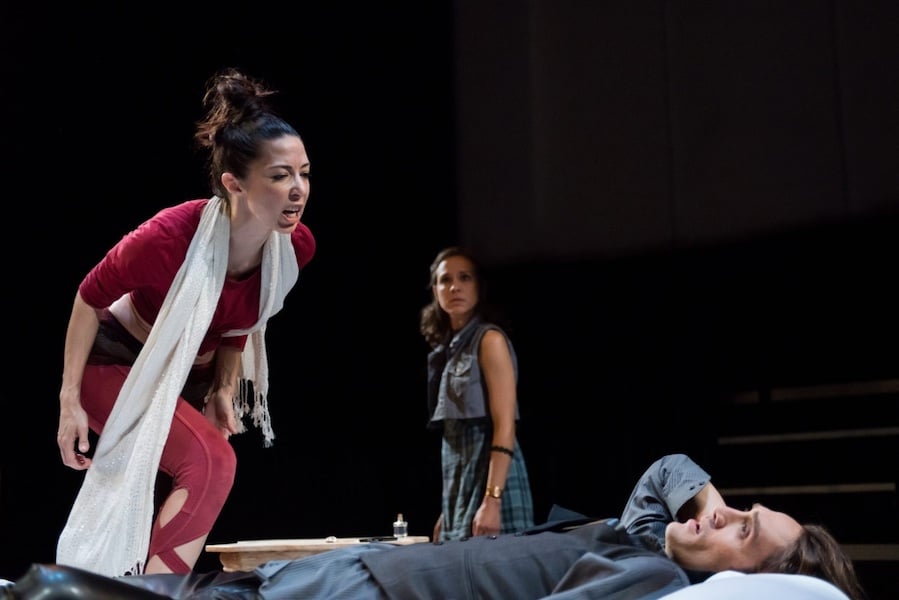
Is the actor’s life what you imagined?
Ha! Well, yes and no. I thought it would be more lucrative. I believed it would be a lot more glamorous than it is. I believed it would be parties and premieres and red carpets. Now? Lordy, I can’t get away from any of those things fast enough. Uta Hagen believed that one might start acting for fame and attention, but the reason one keeps acting is for genuine connection, to audience, to self, in pursuit of understanding the complexities of humanity and feeling. In pursuit of communion. This is absolutely my experience. I believed that I’d meet the most exceptional people as an actor. And in that department, I was spot on. I’ve often been asked if I’d encourage young people to pursue the arts. I wholeheartedly say yes. I’ve met the best people in pursuit of this career. The kindest, smartest, most fun, most creative people. I’ve built a theater family in this city and across this country. These people have taught me so much about lives and thoughts and experiences I’d never otherwise have known about. Not a lot of jobs do that. I think it’s an enormous perk.
How do plays come to your attention and what do you look for in a role?
I’ve been fortunate in recent years to be offered work by playwrights and directors who know my work well and with whom I’ve developed good relationships. I’m always looking for connection. Something about the role that resonates with me, whether a turn of phrase or an action. It is very rare, but I’ve occasionally turned down an offer or an audition for something that I just felt nothing for. Certainly not that the work wasn’t good, but I knew in my gut that it was not a good fit. I like roles that are physical. But I also like challenges. I worked several seasons at CATF where I was cast in less physical, more deeply emotional roles. I loved the challenge. I enjoyed proving to myself that I could get “there” somehow, to those raw, frantic, frightened places.
I’ve read that you enjoy working with playwrights during script development.
I started performing because I liked the applause. But as time went on, I discovered that what I enjoy most is collaboration. I really, really love creating, and I especially love creating as part of a team. I don’t ever want to change a playwright’s vision. I don’t want to rewrite anything. What I want to do is be a sort of conduit. I’m a quick study, I memorize well and fast, and I’m intuitive. If I’m having a hard time memorizing, it usually means something about the line isn’t ringing true. Mentioning this to a playwright has always been taken beautifully, and how it is meant — as an offer to make the work even better than it already is. I once illuminated a character trait for a playwright by emphasizing a line a certain way! She hadn’t even thought of it that way, but once I said it, it opened up possibilities for good rewrites. She wrote it. I only expanded on it. And we just kept building off each other. That sort of thing is magic.
You have been cast in several Kate Hamill plays. Tell us about working with her.
I’m not sure what good I did in a former life to deserve the gift of being one of the Hamill cadre of actors. I knew her husband, Jason O’Connell, first and fangirled all over Kate when we were first introduced at one of his performances. I instantly adored her and hoped she liked me! (I think she does.) I’ve worked with Kate the actress, Kate the playwright, and sometimes when she’s wearing both hats. You know that theory that children don’t need parents to be their friends; they need their parents to be parents? To be in charge, to give their children the gift of safety and structure, not necessarily friendship? Well, Kate mysteriously gives both. I’ve been in several rehearsal rooms with Kate the playwright, and never have I known someone more collaborative, open to suggestion, more into play but firm in her beliefs. When she’s in charge, I feel safe. I feel I’m being led by a smart person who knows what she wants, what she needs, is not afraid to ask for it, but is also kind, compassionate, goofy, scrappy, joyful, and human. She’s about the smartest person I know but is smart without making others feel stupid. Her plays are gifts. They allow so much room for individual interpretation and play. I am most full when performing her plays. Also, I absolutely love that she has a “no jerks” policy.
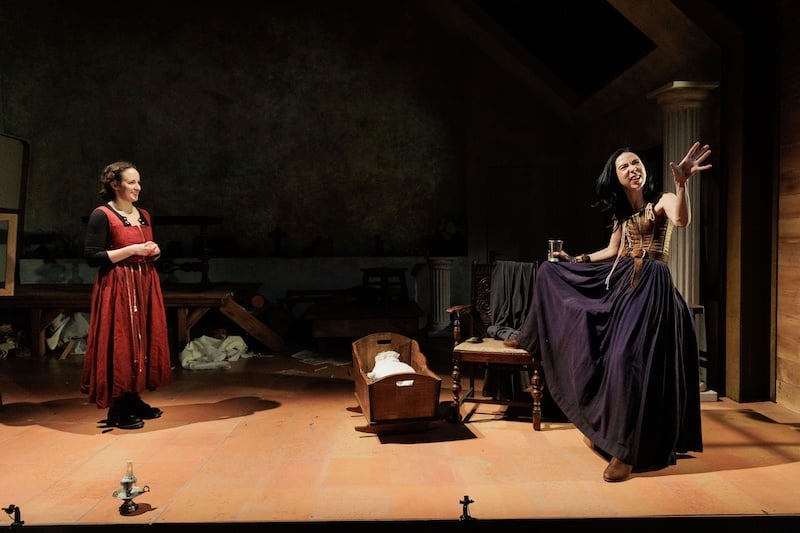
The Light and The Dark made its world premiere at the Upstate New York Chautauqua Theatre. Performances began August 10. When did you first get involved with the play, and how did you see it evolve?
I did an informal reading at her agent’s office shortly after she’d written the first draft. Kate then asked me to be a part of a several-day workshop of the play at The Eugene O’Neill Theater Center a little over a year ago. She only recently told me in our shared dressing room at 59E59 that she wrote that four-character track with me in mind, and I almost burst into tears of gratitude. It has been a few years now, but as with most of Kate’s plays, I feel it was pretty well finished at that first reading. She then refined and polished and made cuts here and there, but it was a strong script right out of the gate. Powerful, and different. My favorite time of any process is rehearsal. That super collaborative part. But I don’t think a performance is finished on opening night. I keep trying to discover new things. I walked off stage on closing night in Chautauqua and told Kate, “Well, I just made a giant discovery about Tuzia. I’m glad I get another crack at this later this year!” And even now that we are open in New York City, we sometimes meet back up in our dressing room reveling at some new way we found of responding to each other on stage. I don’t ever want to be done. I’m always finding something new and wonderful in this play.
Besides a deep dive into the history of the 17th-century painter Artemisia Gentileschi, Kate told TDF that she took painting classes. How did you prepare for your four roles?
It was important for me to make each one very distinct. Right away, for me, that meant physicality. Where each character’s “center” is. Maria is earthy and relaxed and all pelvis. Tuzia lives in the pinched, sour expression on her face. Matteo is a long-limbed tween who feels awkward in his body and in front of people. Mother Superior is all elbows and angles, up and down, bony fingers pointing towards righteousness. Each character also speaks from a different place — deep and chesty, or cracking and high in the head. Mellow and smooth, or sing-songy, like a warning. It was more natural for me to work from the outside in on these roles since they are all so different and supporting to Kate’s lead as Artemisia.
There is full onstage nudity for both you and Hamill as a natural extension of your scenes — you as an artist’s model and she as the painter imagining her self-portrait. Did this take special handling in rehearsal?
Kate and I are naturally pretty comfortable in our bodies. We had intimacy coordinators both in Chautauqua and in New York who were there to be our advocates for what felt comfortable. Most luckily (per Kate’s no-jerk policy), we had a room full of respectful artists who always made us feel comfortable and supported. Mostly, though, we have exceptional crew and dressers, and as I share a dressing room with Kate, we’re super supportive and body-positive around each other. I think it’s important to feel that kind of support backstage so that there is no trepidation on stage.
Why do you think this play about a 17th-century painter is impactful today?
Oof. Because it’s still happening, isn’t it? Even if it’s for a split second, there’s often a moment of thinking, “His word is worth more than hers.” There’s often still skepticism that a woman’s work could be equal to, if not surpass, that of a man’s. There are still sexual predators in positions of power and people who turn a blind eye. Because people often find themselves in impossible, distressing, depressing situations and don’t have the means or support to leave. Because we will always be complicated, resilient creatures searching for light in the darkness. We will always be seeking hope in the bleak.
You live in New York City, but a lot of your work is out of town. What is your home like? And how do you bring home with you on those long stays away?
I live in a sweet, sunny little apartment on the top of a pre-war building in Manhattan. I call it my cabin in the sky and half-joke that I can never leave it. I seriously have a nightmare about four times a year that I’ve given that apartment up. It can get messy, but it’s well-appointed and decorated, and there is no place on earth more comfortable than my bed. I’m saying it’s hard to leave my apartment for several months at a time. Actor housing on regional jobs often leaves a lot to be desired. So I’ve learned to bring along what will make things a little nicer, a little easier for me while I’m away. A good skillet and a good knife. You’d be surprised how often those things are missing from actor housing. One of my good feather pillows. Books. I will also say that as annoying as it can be to arrive at a new workplace and not have things I think I may need, it is fascinating how quickly I adapt. It’s valuable to remind myself how little I actually require.
What would a perfect playday be for you?
I initially thought my answer to this would definitely be a day like today — a matinee with a full, responsive house, followed by dinner with friends, followed by a day off. But really, I love a two-show day, too. Two chances to attack the material in two different states of physicality and mind. We have about two hours between shows on two show days, and I’ll run out and grab some food and then come back and spend time with various cast mates and crew while I eat. There’s very little space backstage at this theater, so the ladies’ dressing room has become a sort of wardrobe/props/green room. I love it. I love joking around with these people. That’s really the best part. The only things I wish I were currently better about would be exercising and making sure I was writing and meditating every day. I go through stages with all of the above and try to not be too hard on myself if one or three fall off during a show run.
From working with playwrights in the early stages of their plays, have you thought of writing plays?
Ugh. Yes. I’ve taken a few playwriting classes and have been encouraged by several friends, including Kate. But I struggle with feeling I have no new or good ideas. I know this is not true, and once I’m through the crappy first draft of anything, I’m inspired, but getting through that first draft is so much harder than one would think. I’m someone who needs structure and pressure. I can come up with really terrific things if given a deadline — if someone outside of myself is counting on it. If anyone out there would like to commission something from me, I’m game, and I don’t think you’d be sorry!
If you were to write your memoir (yes, please!), what would you most want your readers to know about you? And what would the title be?
Wow. What a question. It feels massive. While certainly experiencing my share of heartbreak, I’ve been exceptionally fortunate. I’d need to find a new angle to a memoir. I love reading memoirs and am especially drawn in when an author finds an unexpected way to link their experience to something I’ve thought or felt. It helps me feel less alone. I think I may have unintentionally created a solitary and independent air to my persona. I never wanted children of my own and while marriage is not off the table, it has never been something I sought out. However, I am devoted to my family. And I have created a family of friends I’d be lost without. I’d want my readers to know that people are important to me. Connection, feeling seen, and allowing others to feel seen … that’s so important to me. I’d want to make my readers feel less alone in the world.
As to a title? Ha! That’s a tough one. I’d have to think about it. But something does come to mind. For many years, whenever I ask a question on social media — a recommendation for a physician or a restaurant — I end the request with “Please, and Thank You.” Because I believe it’s pleasant to be polite. And I most definitely believe in gratitude. The only way to get what you need is to ask. And the only way to keep getting the good stuff is to be grateful.
The Light and The Dark (The Life and Times of Artemisia Gentileschi) plays through December 15, 2024, presented by Primary Stages performing at 59E59 Theaters, 59 East 59th Street (between Park and Madison Avenues), New York, NY. Purchase tickets online.
The program for The Light and The Dark is online here.
(This interview evolved over a series of emails.)
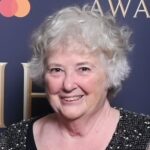
Looking back on my eight decades on the planet, I am most proud of being mother to my daughter Nina, who is an artist. I attended Emerson College in Boston. In Chicago, that city of big shoulders, I was a theater and concert producer, a member of WICCA, the women’s crisis hotline, and editor/publisher of The Newberry Times, a newspaper written by children from my Pilsen neighborhood. Since coming to the DC area, I have produced two Capital Fringe shows and am the Publisher and former Editor of DC Theatre Scene. I live with my husband Tim Treanor and our cat Max in a log house in southern Maryland. I seek out people with open hearts and minds and find them in the most unexpected places.

